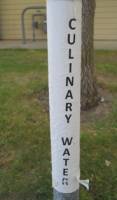Becoming an RVer requires you to learn the language that comes with the lifestyle. It doesn’t take long of being a RV enthusiast to learn that a “slide” is not a piece of playground equipment, a “dinghy” is not a person confined to a mental ward, and “shore power” is not electricity generated by tidal currents. On top of learning RV terminology, you have to learn local terminology as you RV through different regions. If you want an ice tea in the southeast, you ask for sweet tea. In the Eastern United States, hills (small bumps in the topography) are called mountains and in Canada, dump stations are called sanidumps.
 After years of RVing, I thought I knew it all until my wife and I camped in a water and electric site (Full Hook-ups to some) at Hyrum State Park in Utah. When I went to hook up the fresh water hose I found the faucet was labeled “Culinary Water”. I know what potable water is, but “Culinary Water”? Since culinary is associated with cooking I assumed it was safe for drinking and cooking, so I hooked up our hose and turned on the faucet. Fortunately it turned out culinary water was safe to drink, but unfortunately culinary water didn’t improve the results of my cooking! You would think with a fancy name like culinary water something would improve! Learning the local lingo, just another adventure in RVing!
After years of RVing, I thought I knew it all until my wife and I camped in a water and electric site (Full Hook-ups to some) at Hyrum State Park in Utah. When I went to hook up the fresh water hose I found the faucet was labeled “Culinary Water”. I know what potable water is, but “Culinary Water”? Since culinary is associated with cooking I assumed it was safe for drinking and cooking, so I hooked up our hose and turned on the faucet. Fortunately it turned out culinary water was safe to drink, but unfortunately culinary water didn’t improve the results of my cooking! You would think with a fancy name like culinary water something would improve! Learning the local lingo, just another adventure in RVing!
Now if someone could just explain to me what the term “heated pool” means, because it doesn’t seem to have anything to do with the temperature of the water.

Leave a Reply